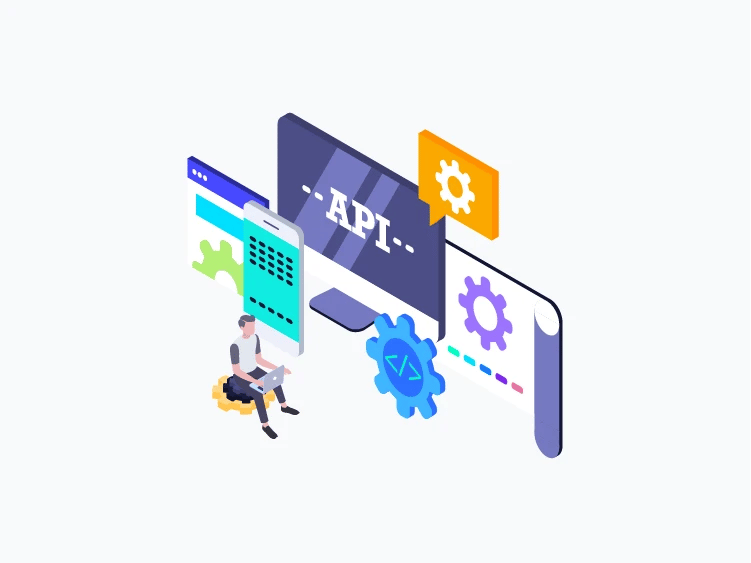
In today's fast-paced digital age, businesses are constantly seeking innovative ways to stand out from the crowd and gain a competitive edge. And that's where bespoke software comes into play. This tailor-made software solution is designed to meet the unique needs of a particular business and its users, providing a one-of-a-kind experience that outshines off-the-shelf software alternatives.
But how can bespoke software be integrated with other systems and applications to unleash its full potential? That's where the power of APIs - application programming interfaces - comes into play! Today, we'll delve into the world of APIs in bespoke software and explore why integration matters. From enhancing functionality to improving productivity, you'll discover how APIs can transform your business and help you achieve your goals. So, let's get started!
APIs are unique sets of protocols, routines, and tools that help different software components communicate with each other. They provide a roadmap for how software systems should interact, ensuring seamless collaboration. APIs are like a language that allows different software systems to speak to each other and work together effectively. With APIs, data exchange, manipulation, and analysis become a breeze, enabling developers to create truly innovative and powerful applications.
Bespoke software is designed to meet the specific needs of a business. However, businesses often use multiple software systems and applications to manage their operations. This can lead to data silos, where information is stored in separate systems and cannot be easily shared. Integration is the process of connecting different software systems and applications, enabling them to communicate with each other and share data. Integration is important in bespoke software due to the benefits it brings with it. Here are the most important ones:
Think of it this way: when businesses use multiple software systems to manage their operations, they often have to manually enter data from one system into another. This can be a frustrating and time-consuming process that can result in mistakes and inaccuracies. But by using APIs to connect bespoke software with other systems, businesses can create a seamless flow of data between different software components, eliminating the need for manual data entry and reducing the risk of errors.
Let's say your business uses a bespoke inventory management system to keep track of your products. You also use a CRM system to manage your customer relationships. Without integration, you'd have to manually enter data from the inventory management system into the CRM system every time a customer places an order. This could take up a lot of your time and could result in errors.
By integrating the bespoke inventory management system with the CRM system using APIs, you can automate the data entry process. This means that when a customer places an order, the bespoke inventory management system can automatically update the CRM system with the relevant information, such as the customer's name, order details, and shipping address. This eliminates the need for manual data entry and reduces the risk of errors.
By automating tasks and workflows through integration, businesses can reduce manual work and save valuable time and resources. This can be particularly helpful for businesses that handle large amounts of data or have complex workflows. When bespoke software is integrated with other systems and applications, staff can enjoy a seamless flow of data between systems without having to manually enter information or perform repetitive tasks.
Let's say your business handles its accounting, invoicing, and payment processing through separate systems. Without integration, your staff would have to enter the same data manually into each system, which would take up a lot of time and could result in errors. By integrating these systems using APIs, you can automate tasks and create a smooth flow of data between systems, giving your staff more time to focus on other important tasks.
If you automate tasks and workflows, you can also reduce the risk of human error, which can be costly and time-consuming to fix. Automating tasks and workflows ensures that they are carried out consistently and accurately, resulting in more reliable and efficient processes. This can ultimately save your business time and money, while also improving the quality of your products and services.
Customised and swift service is the new norm in modern business. A unique software integration approach to the customer-facing systems such as the website, chatbot, and customer service platform offers an individualised and efficient service. Imagine shopping online, and an issue arises with your order. An integrated system allows for swift access to your information, thus creating a better shopping experience.
Furthermore, integration helps in providing an efficient and effective customer service experience. Integration of the customer service platform with other systems allows quick access to customer interactions and data. This improves response time, leading to an increase in customer satisfaction rates.
After-sales support is equally important. Integration of the warranty management system with the customer service platform provides quick access to customer information, purchase history, and warranty details, resulting in better support for customers.
APIs are essential in enabling bespoke software integration with other systems and applications. They facilitate communication between bespoke software and other software systems like CRMs, ERPs, and payment gateways. Moreover, APIs can link bespoke software with third-party applications such as social media platforms and marketing tools.
APIs simplify integration by providing a standardised interface for communication. This ensures that diverse software components can interact using a common set of protocols and rules. The data exchange facilitated by APIs allows businesses to automate workflows, eliminate manual data entry and streamline operations.
APIs streamline bespoke software development. They allow developers to concentrate on the core functionality of the software while APIs take care of the integration with other systems. This saves time and minimises the chances of errors.
If you want to find out more about how API integration can work in your favour, get in touch with our bespoke software developers in UK and tell us more about your business.